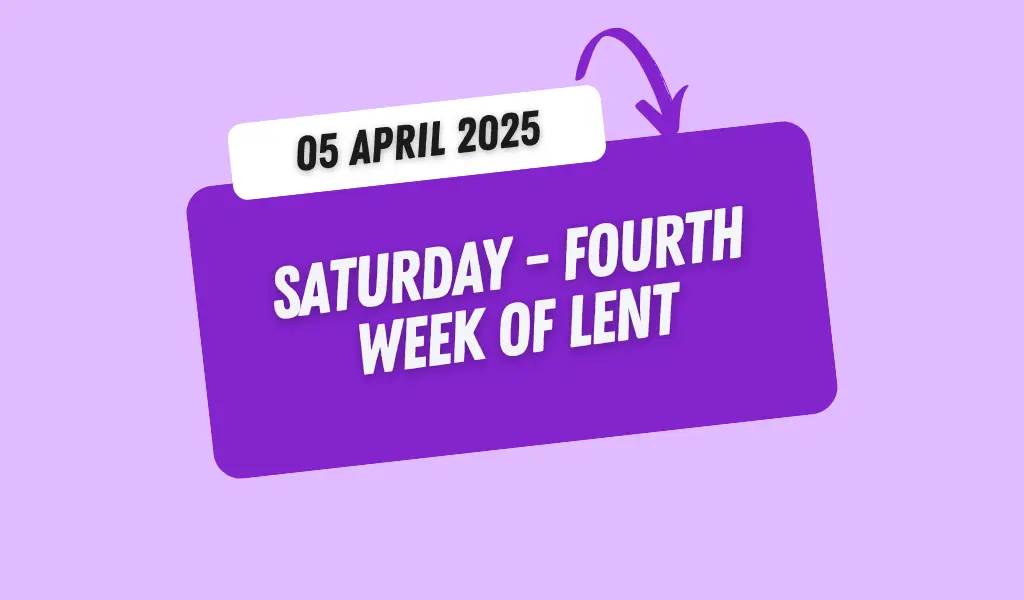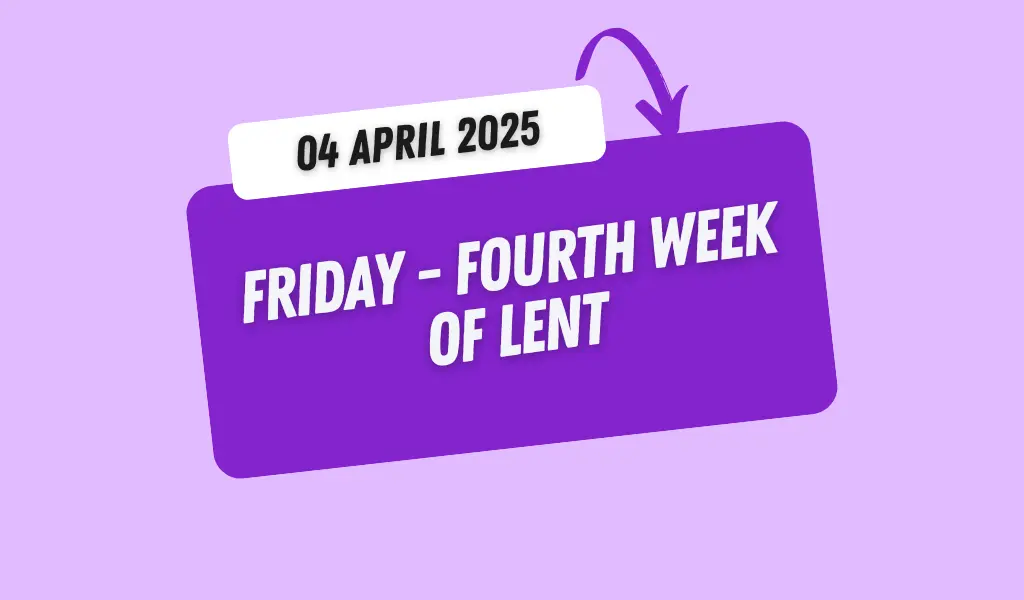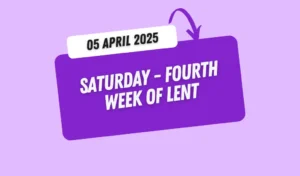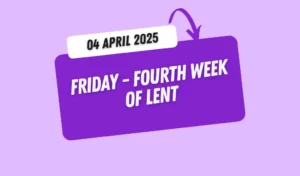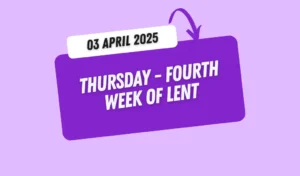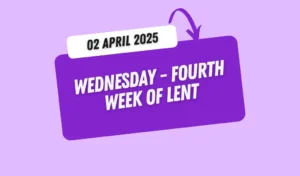Catholic Mass Readings and Reflection November 10, 2024
Thirty-Second Week of Ordinary Time
10th November 2024 (Sunday)
Psalter: Week 2
Reading of the Day
First Reading: 1 Kings 17:10-16
In those days: Elijah [the prophet] arose and went to Zarephath. And when he came to the gate of the city, behold, a widow was there gathering sticks. And he called to her and said, “Bring me a little water in a vessel, that I may drink.” And as she was going to bring it, he called to her and said, “Bring me a morsel of bread in your hand.” And she said, “As the Lord your God lives, I have nothing baked, only a handful of flour in a jar and a little oil in a jug. And now I am gathering a couple of sticks that I may go in and prepare it for myself and my son, that we may eat it and die.” And Elijah said to her, “Do not fear; go and do as you have said. But first make me a little cake of it and bring it to me, and afterwards make something for yourself and your son. For thus says the Lord, the God of Israel, ‘The jar of flour shall not be spent, and the jug of oil shall not be empty, until the day that the Lord sends rain upon the earth.’” And she went and did as Elijah said. And she and he and her household ate for many days. The jar of flour was not spent, neither did the jug of oil become empty, according to the word of the Lord that he spoke by Elijah.
Psalm 146:6c-7, 8-9a, 9bc-10 (R. 1)
R/. My soul, give praise to the Lord
Second Reading: Hebrews 9:24-28
Christ has entered, not into holy places made with hands, which are copies of the true things, but into heaven itself, now to appear in the presence of God on our behalf. Nor was it to offer himself repeatedly, as the high priest enters the holy places every year with blood not his own, for then he would have had to suffer repeatedly since the foundation of the world. But as it is, he has appeared once for all at the end of the ages to put away sin by the sacrifice of himself. And just as it is appointed for man to die once, and after that comes judgment, so Christ, having been offered once to bear the sins of many, will appear a second time, not to deal with sin but to save those who are eagerly waiting for him.
Gospel Acclamation
V/. Alleluia
R/. Alleluia
V/. Blessed are the poor in spirit, for theirs is the kingdom of heaven.
R/. Alleluia.
Gospel : Mark 12:38-44
At that time: In his teaching Jesus said to the crowds, “Beware of the scribes, who like to walk around in long robes and like greetings in the market-places and have the best seats in the synagogues and the places of honour at feasts, who devour widows’ houses and for a pretence make long prayers. They will receive the greater condemnation.” And he sat down opposite the treasury and watched the people putting money into the offering box. Many rich people put in large sums. And a poor widow came and put in two small copper coins, which make a penny. And he called his disciples to him and said to them, “Truly, I say to you, this poor widow has put in more than all those who are contributing to the offering box. For they all contributed out of their abundance, but she out of her poverty has put in everything she had, all she had to live on.”
Daily Gospel Reflection
Sunday – Thirty-Second Sunday of Ordinary Time
Guidelines: Our God is a God of giving. It is a giving that is so generous beyond portions or proportions
1. “Generosity pays willingly and God repays generosity more generously”. What does this mean? The first part, “Generosity pays willingly” means that those who are generous are ready to give away readily, promptly, and joyfully. They know that it costs them, it demands an amount of deprivation, giving up, sacrifice. But they readily pay the price. They bear the burden of others.
2. The second part, “God repays generosity more generously” is evidently clear in its meaning. Those who give generously can rejoice because their giving is not a waste. God takes it into account. He values and appreciates them much. And He rewards them much more abundantly than the extent of their giving.
3. This is what is seen in all three readings. They impress upon us how meritorious is giving. A generous giving merits an abundant reward. The poor widow in the first reading from 1 Kings 17. 10-16 gives to the prophet Elijah so generously the little portion of the meal that she preserves for her and her son. Practically it was the last meal for them because they had no more except to die. As a result, she was rewarded abundantly: the jar of the meal was not spent and the cruse of the oil did not fail.
4. Similarly, the poor widow in the gospel also gives two copper coins to the synagogue treasury. Apparently, it is very little. But it is very big in the sight of God because “she out of her poverty has put in everything she had, her whole living”. Accordingly, she merited the high praises of Jesus and thus his blessings as well. For sure, she would merit God’s salvation as well.
5. In the second reading too from the letter to Hebrews, we have another example of this same culture of giving. And here the example is none other than Jesus himself. Unlike the other high priests, he did not offer various offerings for the atonement of sins. Instead, he offered his own self; as the text says: he has appeared once for all at the end of the age to bear the sins of many and to put away sin by the sacrifice of himself. And the fruit of this selfless self-giving is the expiation of sins and salvation.
6. These examples of generous giving should not be mere matters of biblical knowledge or good exhortations. Primarily they should challenge us for an honest self-examination about our own spirit of giving. They should lay bare our frequent tendencies and instances of greed, dishonesty, manipulation, and accumulation.
7. They should seriously put to question our undue craving for and attachment to money and material possessions and very often even slavery to them as well. They should make us ashamed and repent about our lack of sensitivity, generosity, and sharing. They should inspire and induce us to be generous and joyful givers.
8. Let us recall the inspiring words of Paul in 2 Corinthians 9. 6-7: Verse 6: “The point is this: he who sows sparingly will also reap sparingly, and he who sows bountifully will also reap bountifully.” Therefore, don’t give sparingly; give bountifully, generously. Verse 7: “Each one must do as he has made up his mind, not reluctantly or under compulsion, for God loves a cheerful giver.” Therefore, don’t give begrudgingly; give freely and cheerfully.
Practice: Often what is lacking is not the quantity of resources, but the quality of sharing those resources. The problem is not the lack of having but the lack of giving


